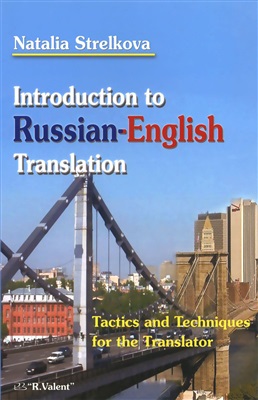М.: Р.Валент, 2013. — 176 с. (Файл достаточно тяжеловесный, но при
сжатии качество сильно ухудшается!)
Данное учебное пособие - это обобщение опыта многих десятилетий работы замечательного переводчика, редактора и преподавателя перевода в московском Инъязе. Написанная живым, ярким английским языком, книга предназначена для лиц, владеющих английским и русским языками и осваивающих навыки перевода.
In today’s world, Russian is playing an increasingly important role.Since perestroika, even before the breakup of the Soviet Union, there has
been a boom in Russian-American relations - political, business, scientific, social, and cultural (to say nothing oftoday’s blogs and tweets). Diplomatic agreements, business and legal contracts, scientific and medical research papers, news and commentary, fiction, non-fiction, and reviews all require translation. However, a native speaker of Russian- particularly one with no training in translation- cannot always successfully render a text into a non-native language such as English. And though now there is access to dozens of excellent new dictionaries, general and specialized, as well as on-line sources, courses geared specifically to translation are few and far between. Exchange programs that send students to the USA for several
months are beneficial for improving knowledge of the language, but they do not train translators. There is a very real need for translators with an
excellent knowledge of both Russian and English, as well as for teachers of translation who can provide professional guidance and practice
Данное учебное пособие - это обобщение опыта многих десятилетий работы замечательного переводчика, редактора и преподавателя перевода в московском Инъязе. Написанная живым, ярким английским языком, книга предназначена для лиц, владеющих английским и русским языками и осваивающих навыки перевода.
In today’s world, Russian is playing an increasingly important role.Since perestroika, even before the breakup of the Soviet Union, there has
been a boom in Russian-American relations - political, business, scientific, social, and cultural (to say nothing oftoday’s blogs and tweets). Diplomatic agreements, business and legal contracts, scientific and medical research papers, news and commentary, fiction, non-fiction, and reviews all require translation. However, a native speaker of Russian- particularly one with no training in translation- cannot always successfully render a text into a non-native language such as English. And though now there is access to dozens of excellent new dictionaries, general and specialized, as well as on-line sources, courses geared specifically to translation are few and far between. Exchange programs that send students to the USA for several
months are beneficial for improving knowledge of the language, but they do not train translators. There is a very real need for translators with an
excellent knowledge of both Russian and English, as well as for teachers of translation who can provide professional guidance and practice

